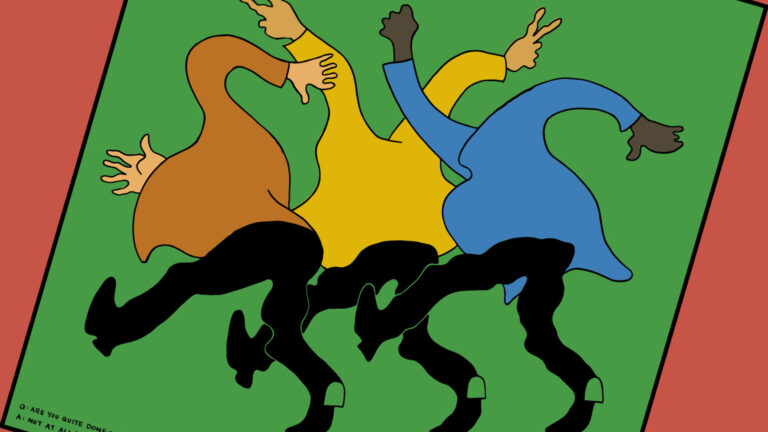May 18th of 2023 marks five years since the release of the album “Wide Awake” by Brooklyn based indie punk band Parquet Courts. The album upon release was met with much critical acclaim and adored by many within the music community itself. Along with this, and I do not say this lightly, it is an album that has changed my life. Legitimately, you can pinpoint an exact moment in time where I switched from grappling with the identity horrors of middle school, that I was mocked and ridiculed for, into being comfortable in my own skin, and listening to “Wide Awake” occupies that space. It worked well on an impressionable young mind.
Since my 13-year-old self didn’t keep up with when all the hot new music was releasing, I missed the roll out of the album, which is a shame because it included excellent music videos tied together with a Mardi Gras theme, and the band members of Austin Brown, Sean Yeaton, Andrew and Max Savage all draped in matching purple suits. Instead of on release day, I first listened to the album early on a summer morning, waiting in a gas station with my mother as our car got an oil change. I was watching the animated gifs that went along with each song, a new feature on Spotify at the time. It was in the midst of the 2018 World Cup, which demands my full attention every four years, so the first track on the record caught my eye.

Image Via Stereogum
The opener “Total Football” begins with punchy guitars backed up by a marching drum beat before suddenly switching to a fast-paced riff with an intricate flying bassline. Andrew Savage sings with a snarky tone before leaving way in the chorus for a calm collective chant among the other members of the band. During the bridge Savage then erupts into a screaming shout as the chaos surrounding builds up to its climax with the repeated cry of “Total Football” among the band members. The song then comes crashing down and recollects itself returning to the same riff as in the intro as Savage continues spewing out his manifesto of collectivism.
The title comes from the 70’s Dutch football tactic that took over the 1974 World Cup, where every player can play any position on the field, swapping roles with one another. The song uses this as a comparison and call to arms for all the different members of society, like listed in the chorus, to set down their classifications that divide them. It calls upon them to break from individualism and come together to fight back against any oppressive force.
Afterwards it then rolls into the opening slam of the second track “Violence.” Overtop the cacophony of a funk-punk jam Savage yells out his anger and frustrations, like a raver through a megaphone, about the abundant presence of violence in daily modern life. Through his witty and dark remarks, like with “Savage is my name because Savage is how I feel when the radio wakes me up with the words suspected gunman,” he calls out the institutions that perpetuate the senseless slaughter, and how it can further drive a person mad hearing about tragedy after tragedy. Spliced in between the verses is an ominous, bellowing voice accompanied by the g-funk whistle characteristic of 90’s hip hop.
The song ends with a bassline that flows perfectly into the one on “Before the Water Gets Too High.” This song mellows out the pace of the record. It has a shuffling beat marked by the clacks of a wood block, and the dissonant drone of an Omnichord, all as the bassline bubbles up and down. The song tells of how at our current pace, we are all marching towards an inevitable doomsday brought on by an impending climate catastrophe. Even with the infinite amounts of warnings, nothing will be done until the oceans rise to the levels of the penthouses that those in power occupy, where the “rich become refugees.”
“Mardi Gras Beads” then begins with shimmering guitar chords, and spacious arpeggios, creating a soaring sound that ripples waves in time to bring back nostalgic feelings as one slow dances by themselves. It’s a love song that guitarist Austin Brown sings to himself remembering the happy moments with a former lover as he fixates on the Mardi Gras Beads hung around his neck. The nostalgia in the song also reflects a time when things were simpler, and away from all the turmoil that is brought up throughout the album.
As the last notes ring out, we are hit with the pummeling riff of “Almost Had to Start a Fight” and staggered staccato shouting as all the anger that was pushed down comes erupting up again back to the surface. The song has a sharp animosity towards people that stoke the flames of intolerance and division, as shown with the lines “What do you do when you are provoked?” and “What if I’ve grown tired of being polite?” From this a burning hostility forms which only feeds into that negative energy, and leaves a person frustrated and exhausted.
The song then shifts into its second part “In and Out of Patience.” It continues the angry emotions and rapid tempo, yet it feels far less serious. This tone is matched by fast paced and bouncy instrumentation. A lot of the grievances here are pretty petty, like dealing with poorly designed public transportation or not having enough time and energy for all the people around you.
The next one is “Freebird II” which has a very uplifting atmosphere, even with the trapped feelings of the lyrics. It has a strutting bassline paired with the warm sound of an organ, which gives it the feeling of a Vietnam era classic rock song. Savage sings about how when you’re born into poverty, you can never truly escape it, as the structure of the world is always trying to push you back into the thick of it. Despite this, there is a sense of emancipation with every member singing in tandem “Free, I feel free, like you promised I would be,” at the end.
The B-side of the record is characterized by quicker, more succinct songs. It begins with the track “Normalization” and its rapidly strummed, then paused, then strummed again guitar riff. The song is about getting used to all the hard to conceive and often horrible aspects of life as time progresses. It has a psychedelic breakdown in the middle to leave room for a bass solo entrenched in a groove, along with metallic drum and guitar parts, and a faint beeping like that of a distant satellite.
Even with the perfect record, there has to be a low point. It’s as Jeff Rosenstock said on “Perfect Sound Whatever,” “Perfect always takes so long, because it don’t exist.” Despite being the weakest song on “Wide Awake,” and almost dragging at points, “Back to Earth” is still a great song. It continues that spacious feel of the closing ambient part on “Normalization” and has this odd, alien like instrumentation. It’s a very enveloping song. Along with this, it has a sweet sentimentality to it.
Then comes the title track, which is overtly fun, and incredibly danceable. It has a bumping bassline, punctuated strutting percussion, shouting in tandem, and bits of flair like the ringing of a whistle or odd off takes of randomly blurted vocals that gives it a wonderful party atmosphere. The phrase “wide awake” is called out repeatedly to mark the common motif of the album of being awake and aware to societies problems and being conscious enough to try to help solve them. The way it’s shouted gives the song a slight punk edge to match the rest of the album. The song is immensely groovy, and insanely funky.
“NYC Observation” has a simple shredding distorted guitar riff that takes frequent breaks to make room for beeping guitar part present throughout the entire song, that sounds like the ticker to a news broadcast. It’s fitting with Savage furiously reporting about all the scenes of intense poverty that paint the scenes on the streets of New York City. With his descriptions, he builds a sense of reflection for those who glide past and ignore houselessness, so as not to muddy their own consciousness, because it’s inconvenient for them to think about it. For an album with a lot of anger, this song exudes some of its rawest emotion.
The guitar riffs on “Extinction” radiate out. Even though it matches the pace of the previous song, it has a much more upbeat and peppy feel. The clean tones, and jangly riffs are allowed to reverberate. This accompanies the song’s message about trying to leave behind all our negative thoughts, and try to focus on positive things. The progression arcs from being down on themselves, like with the line “Masochism forming in the reflection,” to thinking more positively on the line “Spring has finally sprung it’s not cold outside, and I’m thinking of all the places that I want to go.”
“Death Will Bring Change” brings a slower pace and a much more somber tone. The sounds of swelling, crashing pianos faze in and out like violent all-consuming waves. It repeats the theme of spacious distant beeping like on “Back to Earth.” The dreamy echoes of a children’s choir accompany Brown to make this piece sad, but beautiful. Brown sings solemnly about death and how loss can drastically change a person’s life, reflecting on the bitter taste that it leaves.
The album closes with “Tenderness” which acts a triumphant finale that overcomes all the negativity and hostility within the world and one’s own head. The song has a laid back but sprightly atmosphere with its jangling keys and short twangy guitar hits. Savage sings about rising above all the nihilism and desolation in the world. No matter how horrible it gets, there’s still beauty to be found in it. It gives a means to try to come together to improve it. In the end we can still dance and have a good time.

Image on the back of the Wide Awake album cover. Via A. Savage
The artwork adorned on the album cover is iconic, with the three headless marching figures dressed in different colors that compliment each other well. This is all with the rest of the packaging that came from the release. All of it was created by Andrew Savage, who has done the artwork for each Parquet Courts release. It’s manifested in his wavy organic style that accentuates movement.
The overall instrumentation on “Wide Awake” is phenomenal. The fast, light ferocious punk rock of their previous albums is mastered and refined perfectly, like on “Total Football,” “Almost Had to Start a Fight/In and Out of Patiences,” and “NYC Observation.” Infused so well into this are elements of danceable funk music that’s heavy on the title track, while “Violence” is an amazing conglomeration of the two. Parquet Courts being masters of the mellow song do that expertly too, like with “Before the Water Gets Too High” and “Mardi Gras Beads.” At the same time there’s roaring ripping moments that you can mosh too, along with captivating party like ones you can dance to.
This is aided by drummer Max Savage’s consistency and ability to match any tone. His pauses and switches give these songs so much energy and vibrance. This is paired with bassist Sean Yeaton mastering his instrument on this album. Starting out as a guitarist before joining Parquet Courts, he delivers impeccable bassline one after another, and really finds his groove. Those basslines give “Wide Awake” its character. Yeaton lays the groundwork for the record’s combination of punk energy, and funk rhythms.
Other than the use of the term “woke” for the album’s motif, as conservative pundits have bastardized the term to mean anything not straight, white and christian, “Wide Awake” has aged well. The topics throughout are still ever present today. Even on the other side of a global pandemic, not much has changed systematically. Needless and senseless violence persists, where often a person doesn’t have enough time to grieve before the next tragedy hits. The world is still heading towards an environmental disaster, and no one with the power to has decided to act. Bigots have too much of a say in daily concourse. Extreme poverty runs rampant across all of America, effecting a vast majority of it’s people. Despite all of this, we can hold onto the message of using collectivism to voice our displeasures with society and how it’s run. There is still so much beauty in the world to fight for. We just need to hold onto optimism.
“Wide Awake” is one of the greatest albums of all time. It’s my favorite ever. It’s as close as you can get to perfect. You can listen to it, along with the rest of their discography, on the Parquet Courts Bandcamp and other streaming services.




